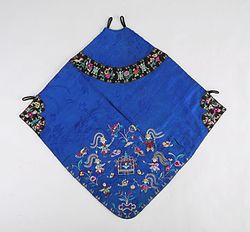Dudou
| Dudou | |||||||||

A child's doudou from the early 20th century, missing its strings.
|
|||||||||
| Chinese name | |||||||||
|---|---|---|---|---|---|---|---|---|---|
| Chinese | |||||||||
| Literal meaning | belly wrap | ||||||||
|
|||||||||
| Doudu | |||||||||
| Chinese | |||||||||
| Literal meaning | [thing that] wraps the belly | ||||||||
|
|||||||||
| Doudou | |||||||||
| Chinese | |||||||||
| Literal meaning | "wrappy" "little wrap" |
||||||||
|
|||||||||
| Vietnamese name | |||||||||
| Vietnamese | yếm | ||||||||
| Transcriptions | |
|---|---|
| Standard Mandarin | |
| Hanyu Pinyin | dùdōu |
| Wade–Giles | tu-tou |
| Transcriptions | |
|---|---|
| Standard Mandarin | |
| Hanyu Pinyin | dōudù |
| Wade–Giles | tou-tu |
| Transcriptions | |
|---|---|
| Standard Mandarin | |
| Hanyu Pinyin | dōudōu |
| Wade–Giles | tou-tou |
A dudou—also known by other names—is a traditional Chinese form of the bodice, originally worn as an undershirt with medicinal properties. With the opening of China, it is sometimes encountered in Western and modern Chinese fashion as a sleeveless and backless halter-top blouse.
In Ancient Chinese, referred to a kind of helmet or hood. By the time of the development of the dudou, it had taken on extended senses of encasing or enwrapping something as in a hood, scarf, or loose parcel.Dùdōu may thus be understood as Chinese for "belly wrap" or "cover", referring to its early use to flatten the breasts and, within traditional Chinese medicine, to preserve stomach qi. Using the same characters, it is also known as a doudu or doudou. The latter form is diminutive and is particularly used for the dudous worn by Chinese children.
Its various Chinese names are typically left untranslated in English. In Chinese sources, the dudou is sometimes mistranslated as a "", which more commonly refers to a variety of other devices including a horse's harness and a compression garment used by expectant mothers. The oddity arises from the similarity of the dudou's purpose (though not construction or appearance) with the Japanese haramaki. In the 19th century, it was translated or glossed as a Chinese "stomacher" or "corset". The dudou is also sometimes translated or glossed as an "apron" or "bib" owing to its similar appearance, but it is not used to protect other clothes from food.
...
Wikipedia
